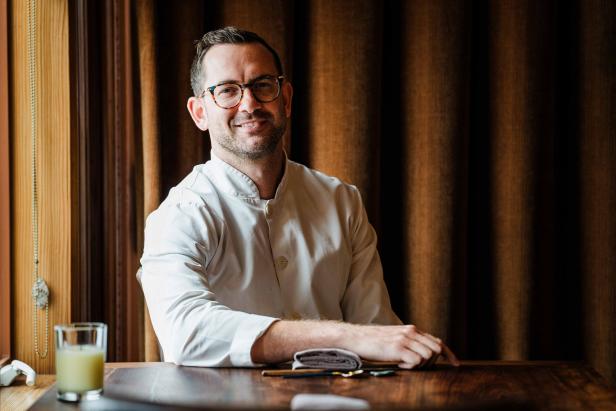 photo credit: Matt Morris
photo credit: Matt MorrisChef Matthew Kammerer at the Harbor House Inn in Elk on the Mendocino Coast.
A celebrated Mendocino Coast chef is featured in a new reality TV show centered around chefs vying for coveted Michelin stars -- an award that many consider the most prestigious in the world of fine dining
Chef Matthew Kammerer and the Harbor House Inn in Elk already hold two Michelin stars, defined by Michelin as "excellent cooking worth a detour" -- a feat in the tiny town on the Mendocino Coast. Kammerer, who earned his first two stars in 2021, will represent Mendocino County on the new Apple TV cooking series.Kammerer also holds a Michelin Green Star for his dedication to sustainability.
Last week, Kammerer was featured on Apple TV's "Knife Edge: Chasing Michelin Stars." The show follows chefs in their quest to earn Michelin stars, focusing on the fact that none of them knows exactly what the Michelin inspectors are looking for. Kammerer's appearance is significant in another way, as many participants are seeking their first or second stars, while Kammerer is going for a third, the highest possible award.
Kammerer does many things differently than most Michelin-star restaurants, such as farming much of the food the restaurant serves at a site in a secret location in Point Arena, a project that Kammerer and his team began during COVID-19.
However, the most standout difference is featured on the show: he maintains total silence in his kitchen.
In an interview, Kammerer shared that the quiet isn't about theatrics -- it comes from his ADD.
"ADD is kind of a trigger word these days, but it's something I've always experienced," he said. "I have a blessing and a curse. I can listen to three conversations at once and hear them all. I can't not hear it. So one day I just decided, nobody talks anymore. Long story short, we got better as a team."
From the shore to the coast
Kammerer's interest in food started as a kid on the Jersey Shore, where special dinners out with his dad sparked his love for eating.
"I would be like nine years old eating anything," he laughed. "My dad told me I was starting to get expensive."
He got a job washing dishes to save up for a car, working his way up to prep cook. College made him realize that, like many with ADD, sitting still all day wasn't for him, so he tried culinary school at Johnson and Wales, a private university in Rhode Island. He said he knew right away that it was the right path.
Kammerer worked in Michelin-star restaurants around the world, from Australia to Hong Kong to Japan, eventually landing in San Francisco. He worked as a sous chef at Saison, which held three Michelin stars at the time. After years in the city, he was ready to run his own kitchen, but he had a vision of a different scene. In his episode of "Knife Edge," he said he kept a journal, dreaming of a rugged coastal spot with a menu rooted in the hyper-local natural world. He wanted the location first, with everything else taking a back seat.
He searched the West Coast, visiting locations in Washington, Oregon and Santa Barbara, but nothing felt quite right.
"It's kind of like that love-at-first-sight thing. I didn't feel connected to anything, and I knew I wanted something -- the word I kept coming back to was 'raw,'" Kammerer said. "I didn't want to see power lines everywhere. I didn't want it to feel like it's 2025."
Kammerer had visited the town of Mendocino before, taking California state Highway 128 and turning north. The first time he turned south onto U.S. Highway 1, everything changed. "I came around the corner and saw the sea stacks and thought, 'Well, this is it,'" he said.
On a later visit, while sitting at picnic tables across from the Elk Store, a local general store and deli, a stranger mentioned that Harbor House Inn was looking for a chef. Kammerer emailed them, expecting no reply -- but he heard back two hours later.
"Nature's in charge here"
Kammerer's food is rooted in what grows and lives around Elk.
Nearly everything on the menu starts at the restaurant's 300-bed farm, which, depending on the season, supplies up to 90% of the produce served at the hotel. The rest comes from nearby farms, such as Mist Farm in Mendocino, a citrus grower outside Anchor Bay, local foragers, and the fishermen who bring in whatever the ocean offers that week. "Nature's in charge here," Kammerer says on "Knife's Edge" -- even if that means the menu changes daily.
That hyper-local approach defines the restaurant's dishes. One course pairs bluefin tuna with a hint of calendula smoke and fresh cucumber, while another -- farm-raised red abalone served with koshihikari rice and a sauce made from the abalone's own offal -- reflects Kammerer's commitment to using every part of what he sources.
He takes the same approach with meat. Harbor House buys whole animals from small ranchers, including lamb raised in Elk and beef from a local ranch. Goat, duck and other proteins come from producers he knows personally. Because he's bringing in whole animals, every cut gets used at the restaurant, whether for breakfast, dinner or in-room dining.
A commitment to sustainability
"When you're working in restaurants at the two- or three-star Michelin level, the amount of waste is just absolutely devastating," Kammerer said. "I knew that when it was time to have my own restaurant, the question of why was going to be the most important thing. It was always about being a more sustainable restaurant, and about training the next generation."
Kammerer isn't messing around -- he said he's told purveyors that Harbor House won't do business with them anymore if they continued to use styrofoam. Instead, Kammerer bought coolers in which suppliers can ship their goods back and forth. He also said the restaurant doesn't use any single-use plastic.
And when it comes to using the whole animal, Kammerer always has a plan -- he noted that there are some dishes people can enjoy through room service, but not in the dining room.
"We get a whole black cod, and the collars get marinated and slowly grilled. We tried to serve a whole fish collar at dinner at one point, and people were shy and didn't want to pick it up with their hands," he said. "You send that thing to a room and shut the door, it comes back just bones. It's a pretty good social experiment."
Most notably might be Kammerer's use of sea urchins to help combat the overpopulation of the purple urchin. The coast's plethora of urchins has a domino effect of negative impacts on marine life.
"Knife's Edge"
Filming "Knife's Edge" was a new experience for Kammerer and his team. The crew spent nearly three weeks filming at the Harbor House. "I quickly realized that it's TV -- you have to let go a little and let the director take their angle," he said.
For Kammerer, the show was about more than just Michelin stars. It was a chance to share Harbor House, his team, the unique flavors of Mendocino County -- and Elk specifically -- with a wider audience.
"I hope it promotes our community and brings people here," he said, mentioning the Elk Store, Matson Mercantile and the Maritime Cafe, all in Elk. "We're all in this together, trying to support Mendocino."
"Knife Edge: Chasing Michelin Stars" is airing now on Apple TV.

 Live Radio
Live Radio




